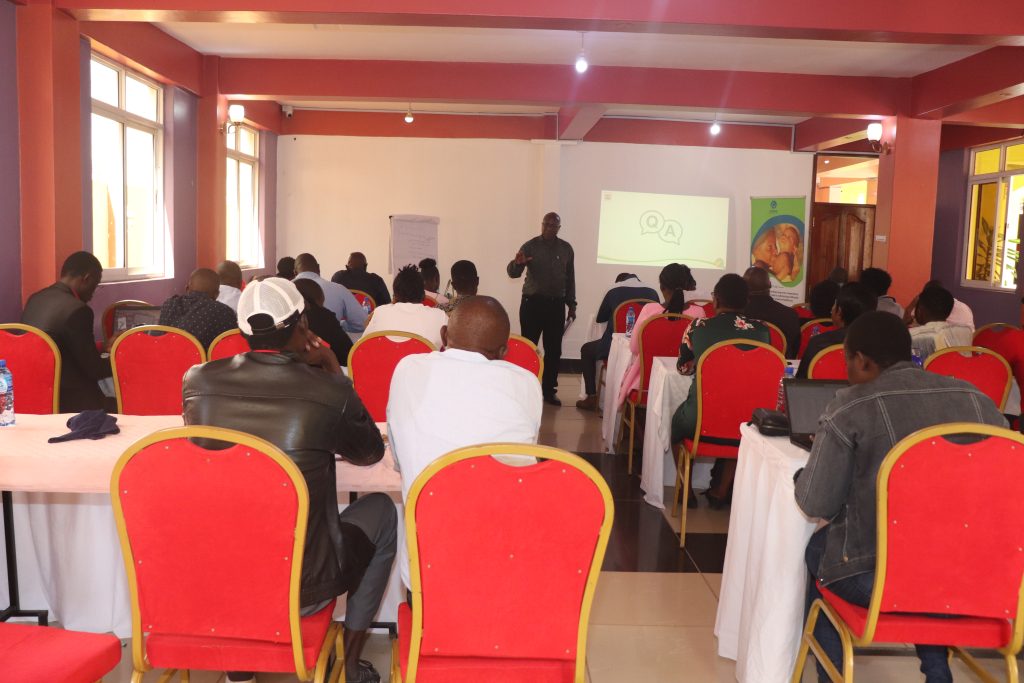Strengthening TB Awareness and Reducing Stigma: Multi-Sectoral Collaboration in Migori County

The TB Workplace Policy and Stigma Reduction Sensitization meeting, held at Florence Hotel in Migori County, brought together key stakeholders to address TB awareness and stigma reduction in workplaces. Supported by the Catholic Medical Mission Board (CMMB) through Red Cross – Global Fund Grant and the National TB Program, the meeting provided a vital platform for discussions on effective strategies. Participants included representatives from the Ministry of Health, Ministry of Education, Teachers Service Commission, Prisons Service, Social Work and Children’s Welfare Services, Police Service, and the media.
During the meeting, Migori County TB Coordinator, John Chacha underscored the urgent need for multi-sectoral engagement in TB control and management. “Let us sensitize and engage all these sectors, be it private or public, in TB control and management,” he urged. He revealed that Migori County, among the other counties conducting a lung health survey, aims to identify and address other lung conditions beyond TB. Chacha lamented the loss of 14 TB clients in the past year alone despite effective management and called for stronger partnerships to improve diagnosis and treatment for other lung-related illnesses.
Alice Kajimba of the Teachers Service Commission called for intensified sensitization efforts targeting educators, school principals, and exam centers. “Let us issue these invites to our teachers and principals while also targeting exam marking centers and incorporate TB education programs in such activities,” she emphasized. Lydia Chacha from the Department of Children Services stressed the importance of expanding sensitization to include orphanages and care homes, where social workers and guardians are at high risk of infection. “Some of these workers cannot distinguish the signs and symptoms of TB. It is time we shifted focus and incorporated them in sensitization missions as well,” she added.
Concerns were also raised by representatives of the mining sector, where young men working in congested spaces often fail to seek or adhere to treatment due to demanding work schedules. Kephas Ojuka, Chair of Migori County Mining Association, expressed appreciation for the training but acknowledged the significant knowledge gap in the sector. “The miners back there don’t quite grasp what TB really is. Aside from coughing, they hardly understand the signs of TB, and this knowledge gap has seen many pay the price. This forum has enabled me to learn, and I plan on using this knowledge to sensitize my colleagues,” he shared. Ojuka urged the county government and donors to extend such trainings to grassroots levels, including mining sites, to ensure broader TB awareness.
The agriculture sector echoed similar concerns, highlighting the need to sensitize farmers who often lack adequate knowledge about TB. A representative from the Department of Agriculture, Livestock, and Fisheries called for targeted educational programs to combat the spread of the disease. Meanwhile, Washington Ocharo, Sub County TB and Leprosy coordinator, Rongo, rallied for optimized TB screening in schools. He revealed that 10 schools in Suna West had already conducted screenings and called for further collaboration with the county’s Director of Education to increase awareness among teachers and students.
The County TB Coordinator also reiterated that implementing non-discriminatory workplace policies and regular TB screenings among high-risk populations, such as miners, would significantly improve TB case detection. “We have so many missed opportunities at the community level and this presents the need to empower all of you to sensitize and educate your peers to improve TB case finding,” he stressed.
Mr. Chacha acknowledged progress, attributing this year’s rise in TB case notifications to increased outreach efforts and better community awareness. He highlighted the county’s focus on DR-TB diagnosis and management, with 23 patients currently undergoing treatment, and noted ongoing plans for refresher trainings to strengthen healthcare worker capacity.
Addressing the issue of stigma, Peter Omware, a clinical officer, called for stronger systems to ensure confidentiality and support for employees undergoing TB treatment. “Some employees live secretly and self-medicate to avoid detection or ridicule for their health struggles,” he said. Omware advocated for psychosocial support and clear management policies that protect the privacy of employees with TB, alongside awareness campaigns as part of workplace health education.
In his closing remarks, County TB Coordinator petitioned for a collective commitment from government, partners and donors to create greater awareness about TB and HIV, describing the effort as both a responsibility and an opportunity to save lives.
CMMB Kenya is a health NGO and Red Cross sub-recipient, implementing under Global Fund towards strengthening health systems and providing quality HIV prevention, care, treatment and support services.
